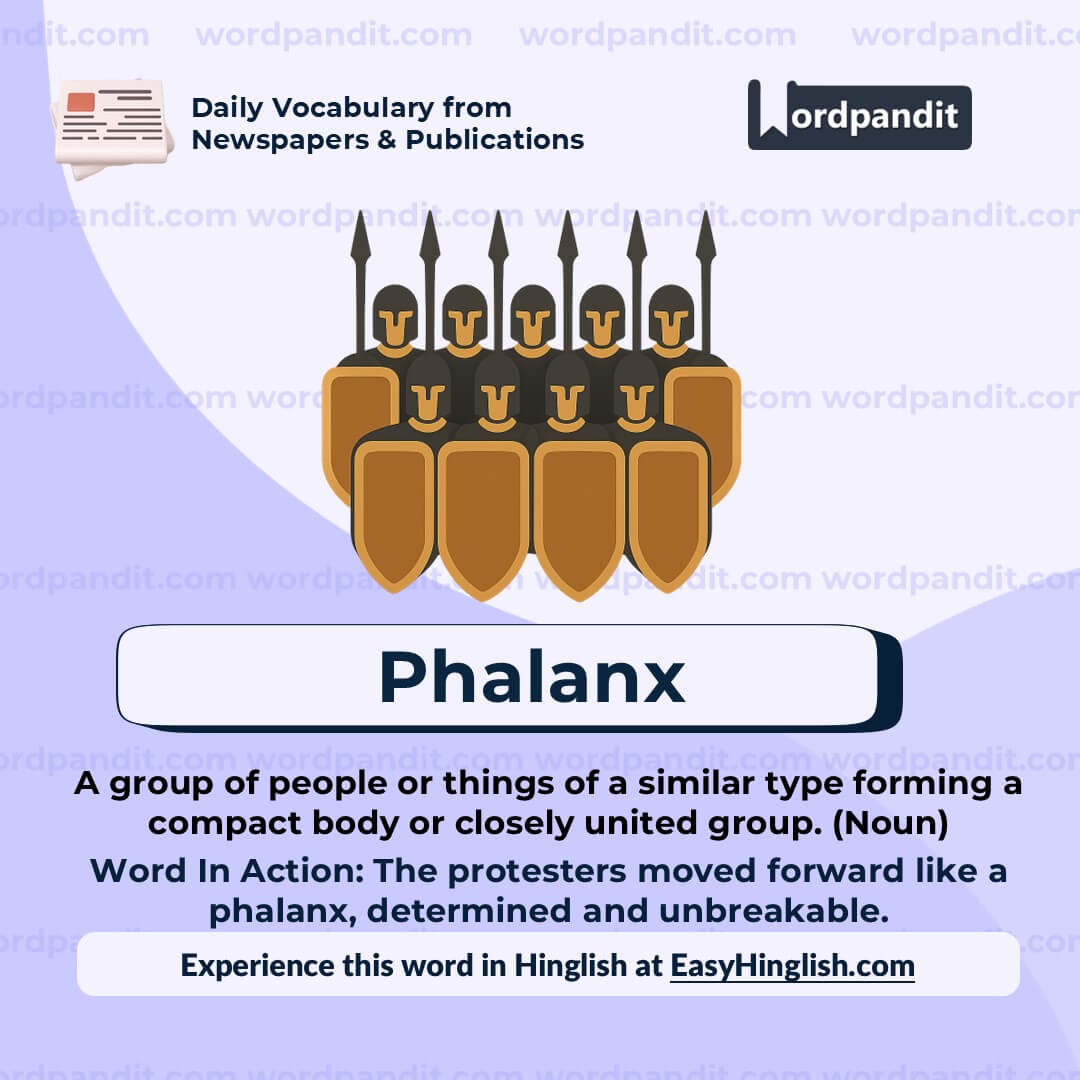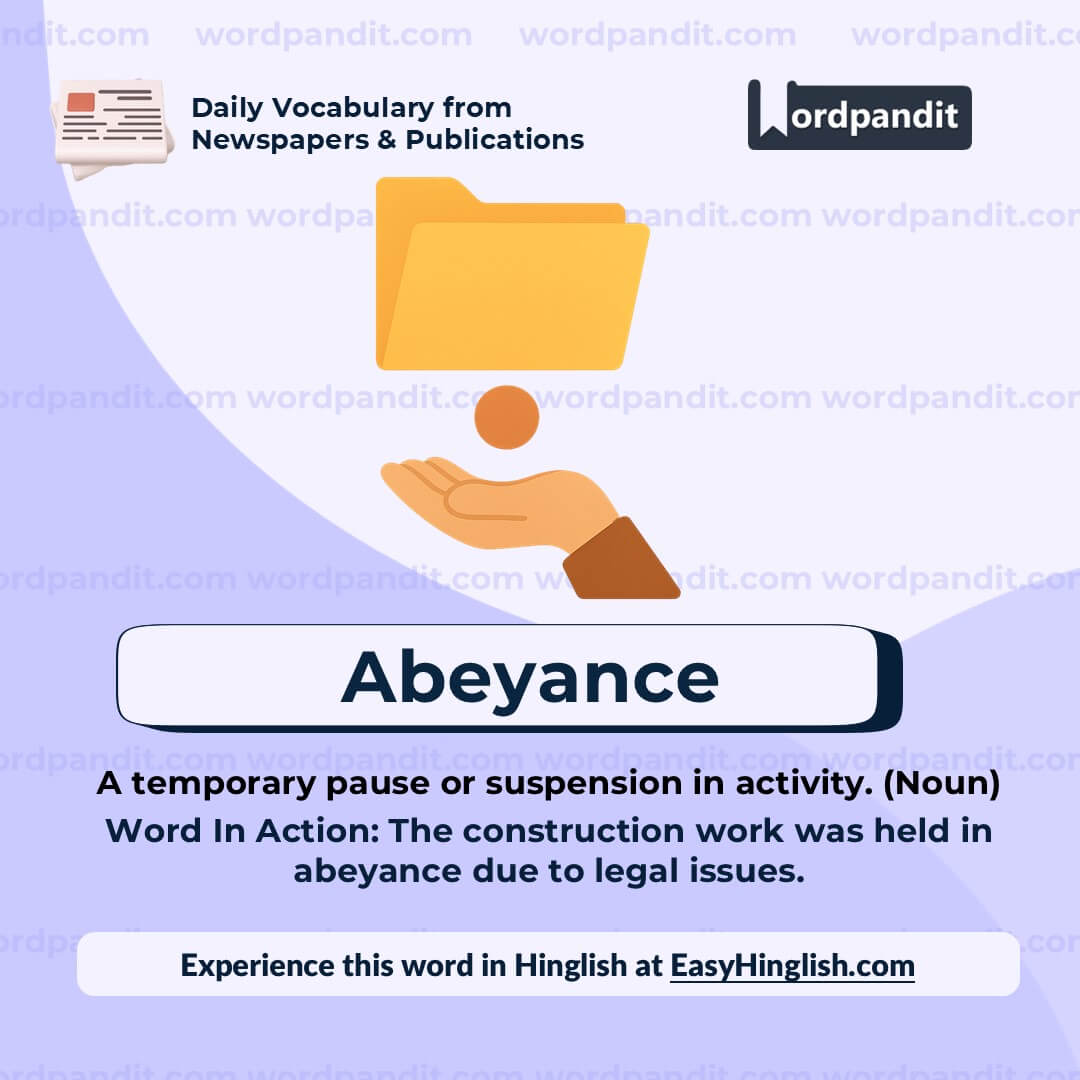Daily Vocabulary from International Newspapers and Publications
Expand Your Vocabulary with Wordpandit’s Global Vocabulary Hub
At Wordpandit, we are committed to helping you develop a truly global vocabulary by drawing from some of the most respected international publications. This section is designed to keep you ahead of the curve by introducing you to words that define global conversations and trends.
The Power of Global Sources
To help you think and communicate on a global scale, we curate vocabulary from renowned international sources, such as:
- The New York Times
- The Washington Post
- BBC
- The Guardian
- The Economist
- Scientific American
- Psychology Today
- And many more...
Stay Global, Stay Competitive
Our daily updates from international publications ensure you are consistently exposed to new words that reflect global news and developments, making sure your vocabulary is not only current but also globally relevant.
Enhance Your Global Perspective
Whether you’re preparing for international exams, aiming to excel in global business communication, or want to enhance your language skills for personal growth, Wordpandit offers the resources you need to thrive in a global context.
Effective Learning, Global Reach
Our learning methodology combines global examples, memory aids, and interactive activities, allowing you to internalize new words effectively and apply them in real-world scenarios.
Begin Your Global Vocabulary Journey Now!
Why Choose Wordpandit?
Practical Learning: Focus on words you'll actually encounter in real-world reading, enhancing your comprehension and communication skills.
Diverse Content: From current affairs to scientific breakthroughs, our varied sources expose you to vocabulary across multiple domains.
Effortless Integration: Make Wordpandit a part of your daily routine. Just a few minutes each day can significantly boost your lexicon over time.
Your Path to Vocabulary Mastery
- Visit our Daily Vocabulary section regularly
- Explore new words and their usage in context
- Practice incorporating these words into your own writing and speech
- Track your progress as your vocabulary expands
Start Your Journey Today
Embark on your vocabulary enhancement journey with Wordpandit. By consistently engaging with our daily posts, you'll build a robust vocabulary that serves you well in academic, professional, and personal contexts.
Remember, a word a day keeps linguistic limitations at bay. Make Wordpandit your daily companion in the quest for vocabulary excellence!
WORD-1: Phalanx
Context:
"A phalanx of security personnel surrounded the visiting dignitary as protests continued outside the conference venue." - Reuters
Explanatory Paragraph:
The word "phalanx" originally referred to a tight formation of soldiers used in ancient warfare, especially by the Greeks. Over time, the word has also come to describe any group of people or things closely packed together and acting in concert, particularly when they are united in purpose or appearance. In the given sentence, "phalanx" emphasizes the dense, organized presence of security personnel protecting the dignitary.
Meaning: A tightly packed group of people or things, often moving or acting together (Noun)
Pronunciation: FAY-lanks
Difficulty Level: ⭐⭐⭐ Intermediate
Etymology: From Greek "phalanx" meaning a line of battle or military formation, later extended metaphorically in Latin and English usage.
Prashant Sir's Notes:
This word is very vivid—whenever you hear “phalanx,” think of a solid wall of people or objects moving or standing together with discipline and unity. It’s often used to suggest strength, protection, or intimidation due to sheer numbers and organization.
Synonyms & Antonyms:
Synonyms: formation, battalion, bloc, line, group, legion
Antonyms: individual, scattering, disarray
Usage Examples:
- A phalanx of reporters waited outside the courtroom for a glimpse of the defendant.
- The protesters moved forward in a phalanx, chanting slogans in unison.
- At the concert, a phalanx of security guards formed a barrier between the crowd and the stage.
- The company deployed a phalanx of lawyers to handle the massive lawsuit.
Cultural Reference:
"The Greek phalanx was a fearsome war machine, with shields locked and spears pointed forward in deadly coordination." - History Channel Documentary
Think About It:
How does the use of the word “phalanx” in modern language shape our perception of unity and strength in groups?
Quick Activity:
Write two sentences using "phalanx" — one in a military/historical context, and another in a modern-day scenario (e.g., business, media, sports).
Memory Tip:
Think of "phalanx" as a "wall of people" — imagine soldiers shoulder-to-shoulder like bricks in a wall. The word sounds like "planks," which are tightly aligned wooden boards — just like a phalanx.
Real-World Application:
Understanding the word "phalanx" helps in interpreting news articles, historical discussions, and even business strategy talks where unified, forceful group actions are described metaphorically.
WORD-2: Abeyance
Context:
"The controversial legislation remains in abeyance while the constitutional challenge works its way through the courts." - Foreign Policy
Explanatory Paragraph:
"Abeyance" is a formal word used to describe a temporary pause or suspension of activity. It's often used in legal, governmental, or procedural contexts to indicate that a process, decision, or law is on hold until a future event or decision occurs. In the context above, it means that the law is not currently in effect—it is awaiting the outcome of a legal process.
Meaning: A state of temporary disuse or suspension (Noun)
Pronunciation: uh-BAY-uhns
Difficulty Level: ⭐⭐⭐ Intermediate
Etymology: From Old French "abeance" meaning "aspiration or expectation," later evolved in legal usage to refer to property or rights that are temporarily without a claimant.
Prashant Sir's Notes:
This word is especially useful in academic, legal, and policy discussions. Think of it as a “pause button” on a process, decision, or plan—it’s not canceled, just paused. Try using it in place of phrases like "on hold" or "pending."
Synonyms & Antonyms:
Synonyms: suspension, pause, postponement, dormancy, standstill
Antonyms: continuation, activity, action, implementation
Usage Examples:
- The city’s expansion plans were put in abeyance due to budget cuts.
- The merger is in abeyance pending regulatory approval.
- With her job offer in abeyance, she continued her search elsewhere.
- Traditions that once defined the festival now lie in abeyance.
Cultural Reference:
"The rule of law cannot be kept in abeyance for political convenience." - A paraphrased sentiment echoed in legal journals during democratic transitions.
Think About It:
In what situations might putting something in abeyance be a wise decision, and when might it be used to avoid taking responsibility?
Quick Activity:
Think of a recent event (political, personal, or professional) and describe what aspect of it could be described as being “in abeyance.” Write one sentence using the word correctly.
Memory Tip:
Think of "abeyance" as "a bay" where ships wait temporarily—it’s a holding place, not a permanent stop.
Real-World Application:
"Abeyance" is often used in legal writing, formal journalism, and corporate communication to describe halted projects, suspended rules, or pending decisions—enhancing clarity and professionalism in expression.
WORD-3: Inchoate
Context:
"What began as inchoate public frustration has evolved into a cohesive movement with specific demands for institutional reform." - The New Yorker
Explanatory Paragraph:
"Inchoate" is a descriptive word used when something is in its early or undeveloped stages. It refers to ideas, feelings, or actions that are just beginning to form but are not yet fully realized, structured, or clear. In the context above, the term suggests that the public’s dissatisfaction initially lacked structure or focus, but later matured into an organized movement with clear goals.
Meaning: Just begun and not fully formed or developed (Adjective)
Pronunciation: in-KOH-it
Difficulty Level: ⭐⭐⭐⭐ Advanced
Etymology: From Latin "inchoatus", past participle of "inchoare" meaning "to begin." The word originally conveyed a sense of starting something without finishing it.
Prashant Sir's Notes:
Think of "inchoate" as something raw or in draft form—like an idea you haven’t fully worked out yet. It's especially useful in academic or analytical writing when you want to show that something is in progress or lacks clear structure.
Synonyms & Antonyms:
Synonyms: rudimentary, undeveloped, nascent, embryonic, vague
Antonyms: developed, mature, complete, structured
Usage Examples:
- His inchoate business plan lacked the details needed to secure funding.
- The artist shared an inchoate sketch of her next painting.
- The policy proposal was still in an inchoate stage, open to feedback and revision.
- Her inchoate sense of injustice eventually led her to become a human rights advocate.
Cultural Reference:
"Revolutions often begin as inchoate unrest—unfocused, spontaneous, but full of potential." - A frequent theme in political theory and history texts
Think About It:
Can inchoate ideas or feelings sometimes be more powerful or dangerous than well-defined ones?
Quick Activity:
Think of a project or idea you once started but didn’t finish. Describe it in one sentence using the word “inchoate.”
Memory Tip:
Break it down: “in-choate” = “in chaos” — something that’s chaotic or not yet formed clearly.
Real-World Application:
Writers, journalists, lawyers, and policy analysts use “inchoate” to describe early-stage ideas or efforts. It’s especially valuable when discussing movements, plans, or feelings that are in progress but lack complete structure.
WORD-4: Circumlocution
Context:
"The diplomat's response was a masterclass in circumlocution, addressing the question for several minutes without actually answering it." - CNN
Explanatory Paragraph:
"Circumlocution" refers to the use of unnecessarily wordy or indirect language to express an idea, often to avoid stating something directly. It’s frequently used in political, diplomatic, or evasive speech, where speakers may want to sound polite or avoid controversy. In the example, the diplomat skillfully avoided a direct answer by using elaborate, roundabout language—classic circumlocution in action.
Meaning: The use of many words where fewer would do, especially to be vague or evasive (Noun)
Pronunciation: sur-kum-loh-KYOO-shun
Difficulty Level: ⭐⭐⭐⭐ Advanced
Etymology: From Latin "circum" (around) + "locutio" (a speaking), literally meaning “talking around” something.
Prashant Sir's Notes:
Circumlocution is a fancy word for "beating around the bush." It’s a common tool in diplomacy, bureaucracy, and politics—where saying something too directly might be risky or impolite. Watch out for it in speeches and meetings!
Synonyms & Antonyms:
Synonyms: evasion, verbosity, periphrasis, wordiness, indirectness
Antonyms: directness, conciseness, straightforwardness
Usage Examples:
- Her explanation was full of circumlocution and left everyone more confused than informed.
- Instead of giving a clear answer, he relied on circumlocution to avoid the controversial topic.
- The company's apology was criticized for its circumlocution and lack of accountability.
- Children often use circumlocution when trying to explain why they broke the rules.
Cultural Reference:
"Political speeches are often examples of circumlocution, where leaders say a lot without really saying anything." - Common media critique across political commentary platforms
Think About It:
Is circumlocution always a bad thing, or can it be useful in sensitive conversations?
Quick Activity:
Rewrite this sentence using circumlocution: “I lost the file.” (Try to make it sound polite, diplomatic, or overly complicated.)
Memory Tip:
Break it down: "Circum" = around, "locution" = speech → “speaking around” the topic instead of hitting it directly.
Real-World Application:
Recognizing circumlocution helps you cut through vague or evasive language—useful in interpreting political discourse, legal statements, and even office emails. It also helps you become a clearer, more effective communicator by knowing what to avoid.
WORD-5: Desultory
Context:
"After initial progress, peace talks have become increasingly desultory, with months passing between substantive negotiations." - Foreign Affairs
Explanatory Paragraph:
"Desultory" is used to describe actions, conversations, or efforts that are disconnected, lacking consistency, or done without a clear plan or enthusiasm. In the sentence above, it reflects how the peace talks have become irregular and ineffective, happening sporadically without much continuity or focus. The word often carries a negative tone, suggesting a lack of commitment or direction.
Meaning: Lacking a clear plan, purpose, or enthusiasm; occurring randomly or sporadically (Adjective)
Pronunciation: DEH-suhl-tuh-ree
Difficulty Level: ⭐⭐⭐⭐ Advanced
Etymology: From Latin "desultorius" meaning "leaping or jumping from one thing to another," from "desilire" (to leap down). Originally used to describe horse riders who jumped between horses.
Prashant Sir's Notes:
Use “desultory” when something feels aimless or half-hearted—like a casual conversation that goes nowhere, or efforts that don’t follow through. It’s a great word to describe inconsistency, especially in serious contexts like diplomacy, productivity, or behavior.
Synonyms & Antonyms:
Synonyms: aimless, random, haphazard, unfocused, erratic
Antonyms: methodical, focused, systematic, deliberate
Usage Examples:
- His desultory studying habits made it hard for him to retain any information before exams.
- The conversation was desultory, jumping from weather to politics to personal stories without any real depth.
- They made a desultory effort to clean up the yard before giving up entirely.
- Peace efforts have been desultory at best, with no consistent dialogue between the parties.
Cultural Reference:
In many classic novels, particularly from the Victorian era, characters often engage in desultory social visits—meandering conversations without purpose, highlighting social norms of the time.
Think About It:
Why do you think important efforts—like peace talks or climate policies—sometimes become desultory? What factors contribute to such a loss of direction?
Quick Activity:
Write a short paragraph about a project or routine in your life that became desultory. Use the word in your paragraph.
Memory Tip:
Think of someone “leaping” from task to task with no plan—just like the Latin root. “Desultory” = disorganized jumps = scattered or unfocused efforts.
Real-World Application:
In professional communication, describing efforts or discussions as "desultory" can precisely convey the sense of disorganization or lack of progress. It's especially useful in reports, analyses, and feedback.



















